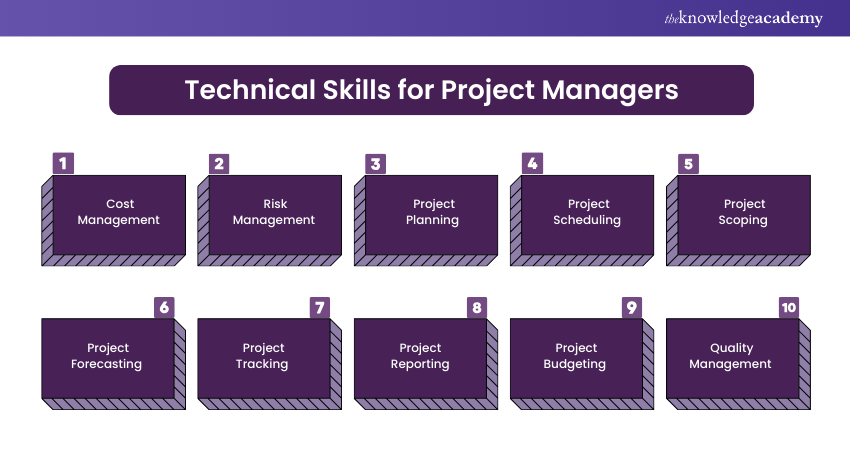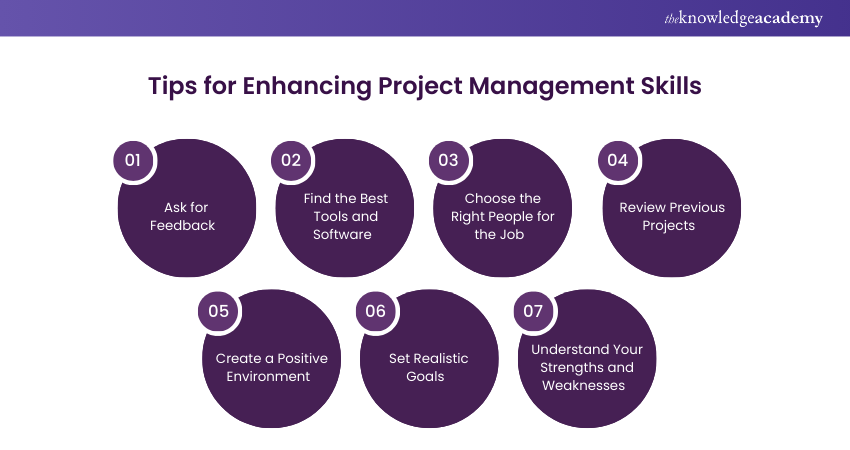We may not have the course you’re looking for. If you enquire or give us a call on +44 1344 203 999 and speak to our training experts, we may still be able to help with your training requirements.
We ensure quality, budget-alignment, and timely delivery by our expert instructors.

Have you ever wondered what it takes to steer a project from conception to completion seamlessly? The secret lies in Project Management Skills. These skills are a dynamic blend of technical expertise, strategic thinking, and soft skills that together pave the way for successful project outcomes.
Project Management Skills encompass a range of abilities essential for planning, executing, and completing projects effectively. By mastering these skills, you can turn chaos into order and vision into reality, ultimately leading your projects to successful completion. Ready to unlock your potential and lead your projects to victory? Let's embark on this journey and transform your Project Management prowess!
Table of Contents
1) What are Project Management Skills?
2) Soft Skills for Project Managers
3) Technical Skills for Project Managers
4) How to Improve Project Management Skills?
5) Conclusion
What are Project Management Skills?
Project Management Skills encompass a range of competencies and proficiencies essential for efficiently planning, executing, and finalising projects. These skills are pivotal in guaranteeing that tasks are completed on time, within budget, and meet predetermined goals. They include strategising project scopes, creating realistic schedules, allocating resources effectively, and managing risks.
Additionally, communication, leadership, and team-building skills are vital for guiding project teams to success. Adaptability and problem-solving skills are equally crucial to address unexpected challenges. Project Management Skills are a dynamic combination of technical expertise, interpersonal capabilities, and strategic thinking, ensuring projects are completed successfully.
Soft Skills for Project Managers
Soft skills for Project Managers are the interpersonal and emotional abilities that help them work effectively with their teams, clients, and stakeholders. Some of the examples of soft skills are:

1) Communication
Professionals in Project Management need to be proficient in communication. Poor communication is frequently blamed for projects' missing deadlines, exceeding budget, or otherwise failing.
Effective communication goes beyond simply being able to talk well in front of others; it is crucial. Project Managers need to be aware of who, when, and how often they should communicate with. It can entail establishing expectations for how frequently communications will occur at the start of a project.
2) Organisation
Organisation means effectively planning, prioritising, and managing tasks, resources, and time. Organisation is essential for Project Managers, as they oversee multiple aspects of a project, such as scope, budget, quality, and risks. The organisation helps Project Managers deliver the project on time, within budget, and meet the project's goals.
3) Motivation
Motivation involves inspiring and encouraging yourself and others to achieve a common goal. Motivation is important for Project Managers, as they must lead and support their team members, who may have different skills, personalities, and backgrounds. Motivation helps Project Managers create a positive and productive work environment where team members are engaged, committed, and satisfied.
4) Leadership
Leadership means influencing, guiding, and directing others towards a shared vision. Leadership is crucial for Project Managers, as they must communicate project objectives, roles, and responsibilities to their team members, stakeholders, and sponsors. Leadership helps Project Managers build trust, confidence, and collaboration among the project participants and resolve any conflicts or issues that may arise.
5) Collaboration
Collaboration is crucial in Project Management, expediting work and enhancing efficiency. Cross-team coordination offers unique perspectives and nurtures creativity, leading to well-rounded outcomes. Enhancing collaboration involves frequent communication practice, active listening, and open dialogue. Building a culture of co-creation is fundamental to fostering a collaborative, high-performing team.
6) Time Management
Time Management and organisational skills are intertwined, with better task organisation providing a clearer workload overview and improved task duration estimation. Staying focused and prioritising work can be challenging, but a task priorities list enhances Time Management and reduces procrastination. By addressing high-priority tasks first, you ensure nothing is overlooked, maintaining productivity and staying on top of responsibilities.
7) Problem-solving
Problem-solving skills involve iterative and collaborative abilities to effectively tackle challenges. These skills require fresh perspectives and methodical solutions, not just the "correct" answers. Enhancing problem-solving capabilities involves data-driven decision-making and systematic analysis. For example, to increase sales by 10%, conduct competitor research to assess market position, then use insights to develop a new marketing strategy with the sales team.
8) Adaptability
Adaptability in Project Management involves adjusting to new conditions and changes in the project environment. This skill ensures projects continue smoothly despite unforeseen challenges.
By recognising when and how to transition effectively and developing self-awareness and mindfulness, Project Managers can manage their emotions and maintain the project's trajectory during periods of change.
9) Critical Thinking
Critical thinking in Project Management involves analysing situations and making well-informed decisions by evaluating information and considering the long-term impacts. This skill helps Project Managers anticipate potential issues, weigh various options, and choose the best course of action.
By doing so, they ensure effective problem-solving and strategic planning for successful project outcomes.
10) Patience
Patience means remaining calm and composed in stressful or challenging situations. It also means waiting for something without getting frustrated or angry. Patience is an important skill for Project Managers, as they must deal with uncertainty, complexity, and change in their projects.
It helps Project Managers cope with pressure, adapt to different circumstances, and handle feedback and criticism.
11) Negotiation Skills
These skills help you reach an agreement or a compromise with another party. Negotiation skills involve communication, persuasion, problem-solving, and conflict resolution. Negotiation skills are vital for Project Managers, as they must negotiate with various stakeholders on aspects of the project, such as:
a) Scope
b) Budget
c) Quality
d) Deadlines
Negotiation skills help Project Managers achieve a win-win outcome where both parties are satisfied and the project objectives are met.
12) Interpersonal Skills
These skills help you interact and communicate effectively with other people. Interpersonal skills include listening, speaking, writing, presenting, and empathising. Interpersonal skills are essential for Project Managers, as they must work with diverse and multidisciplinary teams and establish and maintain good relationships with all project stakeholders.
Interpersonal skills help Project Managers convey information, understand different perspectives, and manage expectations and emotions.
Get a holistic overview of Project Management Office (PMO) components. Register for our Project Management Office Fundamentals Certification Course now!
Technical Skills for Project Managers
Technical skills for Project Managers are the abilities and knowledge related to the specific technologies, tools, and methods used in managing projects. These skills are essential for Project Managers to plan, execute, monitor, and control projects effectively and efficiently. Some of the technical skills for Project Managers are:

1) Cost Management
Cost Management entails planning and controlling the project budget to ensure costs remain within approved limits. This involves detailed cost estimation, creating a realistic budget, and ongoing cost control to track and manage expenses. Effective Cost Management helps prevent budget overruns and ensures the project is financially sustainable from start to finish.
2) Risk Management
Risk Management involves identifying, assessing, and mitigating risks that could impact the project. This process includes developing comprehensive Risk Management plans and contingency strategies to address potential issues before they become critical. By proactively managing risks, Project Managers can minimise negative impacts on the project's timeline, budget, and overall success.
Master Risk Management Black Belt Course for advanced Project Managers – join now!
3) Project Planning
It involves defining the project scope, objectives, deliverables, milestones, tasks, and resources. Project planning also involves creating a project charter, management plan, and a work breakdown structure. Project planning helps to establish the project direction, scope, and baseline.
4) Project Scheduling
It involves developing and maintaining a project schedule that shows the sequence, duration, dependencies, and resources of project activities. Project scheduling also involves using tools like Gantt Charts, Network Diagrams, and Critical Path Analysis. Project scheduling helps to coordinate and track the project's progress and performance.
5) Project Scoping
It involves defining and managing the project scope, the set of features, functions, and requirements the project must deliver. Project scoping also involves identifying and controlling the scope changes and ensuring the project meets the stakeholders' expectations and needs. Project scoping helps to avoid scope creep and ensure the project quality.
6) Project Forecasting
It involves predicting the future outcomes and trends of the project based on the current data and information. Project forecasting also involves techniques such as earned value, trend, and variance analysis. Project forecasting helps anticipate and mitigate project risks and issues and adjust the project plan accordingly.
7) Project Tracking
Project tracking measures progress by monitoring activities involved in a project. It determines if the project is on schedule, identifies issues causing delays, and provides resolutions.
This essential process begins early and continues throughout the project. Both progress and performance are tracked to stay on schedule and address bottlenecks, ensuring timely delivery within budget constraints.
8) Project Reporting
It involves communicating and presenting the project status, results, and outcomes to the project stakeholders and other relevant parties. Project reporting also involves using dashboards, charts, graphs, and tables. Project reporting helps inform and update the project stakeholders and other relevant parties about its performance and progress and solicit their feedback and support.
9) Project Budgeting
The project budget drives the project, turning concepts into action. Effective budget management involves estimating, tracking, and controlling costs and resources throughout the project's life cycle to ensure expenses stay within the planned budget. This process includes creating a project budget, cost baseline, and Cost Management plan, ensuring the project's profitability and viability.
10) Quality Management
Quality Management ensures project deliverables meet required standards and specifications through quality planning, assurance, and control. Quality planning identifies necessary standards, ensures that processes are implemented to meet these standards, controls and monitors results for compliance, and addresses defects as needed. This ensures the final product meets stakeholders' expectations and predefined criteria.
Transform your Project Management career - join our Project Management Black Belt Course and unlock your Leadership potential now!
How to Improve Project Management Skills?
Improving your Project Management Skills takes experience and practice. Here are steps to further develop your abilities:

1) Ask for Feedback
a) Seek feedback from teammates regularly to identify areas for improvement.
b) Request feedback immediately after completing a project while details are fresh.
c) Gather feedback through official documents or meetings to review what went right and wrong.
2) Find the Best Tools and Software
a) Use tools and software that simplify documentation and communication.
b) Research industry-specific tools and programs to find what suits your management style.
c) Consider cloud-based management software or daily written checklists.
3) Choose the Right People for the Job
a) Assign team members based on their strengths and weaknesses
b) Analyse coworkers' abilities to place them in roles where they can excel
c) Remember, a Project Manager's effectiveness is tied to the strength of their team
4) Review Previous Projects
a) Analyse past projects to learn from mistakes and successes
b) Seek advice from senior Project Managers on their successful strategies
c) Use insights from previous projects to improve current ones
5) Create a Positive Environment
a) Foster trust, respect, and understanding among team members
b) Praise and recognise team efforts to boost morale
c) Ensure employees feel heard, valued, and happy to work in the environment
6) Set Realistic Goals
a) Establish achievable goals to set the team up for success
b) Avoid overwhelming the team with unrealistic expectations
c) Clearly communicate goals with clients and managers to avoid confusion
7) Understand Your Strengths and Weaknesses
a) Be aware of your limitations and seek help when needed
b) Identify areas for improvement to enhance your skills
c) Recognise your strengths to build confidence and provide better service
Boost your Project Management expertise with our top-rated Project Management Courses - sign up today and lead with confidence!
Conclusion
Mastering Project Management Skills is crucial for turning complex projects into clear, successful outcomes. By developing key abilities in planning, execution, and Leadership, you can unlock your potential and lead your projects to success. Start honing these skills today and watch your achievements grow.
Kickstart your Project Management career with our comprehensive Project Management Certification Course - join today!
Frequently Asked Questions

Crucial Project Management Skills for career advancement include effective communication, Leadership, Time Management, Risk Management, and problem-solving. Mastery of these skills ensures successful project execution and positions you as an asset in any organisation.

Advanced Project Management Skills enhance job opportunities by showcasing your ability to lead projects successfully and manage risks. Meeting goals effectively makes you a highly valuable candidate for employers.

The Knowledge Academy takes global learning to new heights, offering over 30,000 online courses across 490+ locations in 220 countries. This expansive reach ensures accessibility and convenience for learners worldwide.
Alongside our diverse Online Course Catalogue, encompassing 17 major categories, we go the extra mile by providing a plethora of free educational Online Resources like News updates, Blogs, videos, webinars, and interview questions. Tailoring learning experiences further, professionals can maximise value with customisable Course Bundles of TKA.

The Knowledge Academy’s Knowledge Pass, a prepaid voucher, adds another layer of flexibility, allowing course bookings over a 12-month period. Join us on a journey where education knows no bounds.

The Knowledge Academy offers various Project Management Courses, including Introduction to Project Management Certification Course and Project Management Masterclass. These courses cater to different skill levels, providing comprehensive insights into Project Management Methodologies.
Our Project Management Blogs cover a range of topics related to Project Management Skills, offering valuable resources, best practices, and industry insights. Whether you are a beginner or looking to advance your skills in Project Management, The Knowledge Academy's diverse courses and informative blogs have you covered.
Upcoming Business Skills Resources Batches & Dates
Date
 Introduction to Project Management Course
Introduction to Project Management Course
Fri 14th Mar 2025
Fri 9th May 2025
Fri 15th Aug 2025
Fri 10th Oct 2025
Fri 12th Dec 2025







 Top Rated Course
Top Rated Course



 If you wish to make any changes to your course, please
If you wish to make any changes to your course, please


